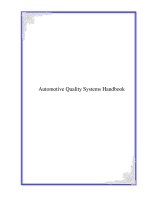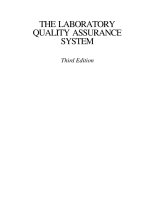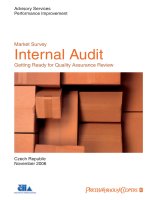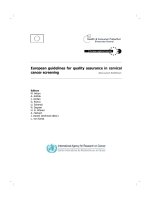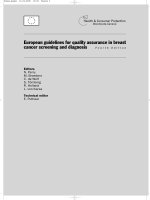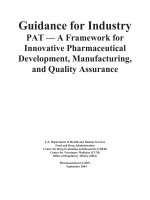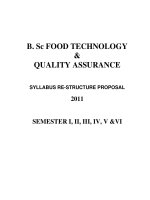Xpertis quality assurance handbook
Bạn đang xem bản rút gọn của tài liệu. Xem và tải ngay bản đầy đủ của tài liệu tại đây (466.37 KB, 20 trang )
Quality Assurance Handbook 2020-21
Table of Contents
1. Introduction ................................................................................................................... 2
2. Senior Administrative Team......................................................................................... 3
CEO ................................................................................................................................................ 3
Programme Administrator .............................................................................................................. 3
Centre Manager(s) ......................................................................................................................... 4
KPIs ................................................................................................................................................ 4
3. Academic Staff .............................................................................................................. 6
Unit Leaders ................................................................................................................................... 6
Lecturers......................................................................................................................................... 6
4. Committees ................................................................................................................... 7
Board of Governors ........................................................................................................................ 7
Admissions and Programme Committee ........................................................................................ 8
Assessment Board ......................................................................................................................... 8
5. Programme Documentation ......................................................................................... 9
Policies and Procedures ................................................................................................................. 9
Programme Specifications ............................................................................................................. 9
Unit Descriptors .............................................................................................................................. 9
6. Programme Monitoring and Evaluation .................................................................... 10
Ongoing Quality Assurance and Improvement ............................................................................ 10
Periodic Quality Assurance and Improvement ............................................................................. 11
7. Assessment Sampling ................................................................................................ 13
Basis for Sampling........................................................................................................................ 13
Sampling Procedure ..................................................................................................................... 13
Appendices ...................................................................................................................... 15
Appendix 1: Important Documentation ......................................................................................... 15
Appendix 2: Internal Quality Assurance Form.............................................................................. 16
Appendix 3: Sampling Tracker Template ....................................................................................... 0
© 2020 Xpertis College, All Rights Reserved
1. Introduction
The purpose of this handbook is to provide staff, students and external partners with
a clear articulation of the college’s approach to quality assurance. It describes the
structures, roles, responsibilities and processes that the college implements to both
provide a high-quality educational experience and to ensure this level of quality is
maintained. The contents of this handbook are informed by and seek to reflect the UK
Quality Code for Higher Education, which staff are encouraged to read alongside this
handbook; a link to this code can be found in the Appendices, along with details of
other important documents.
© 2020 Xpertis College, All Rights Reserved
2. Senior Administrative Team
CEO
The CEO is the primary decision-maker at the college. They direct the senior
administrative team and are responsible for the hiring of new staff and management
of current employees. The CEO is the accountable officer for quality assurance across
the college, as many of the processes and checks which ensure quality is maintained
either originate or receive their final approval from this position. As part of QA, the
CEO sets targets for academic achievement and student recruitment each year,
organises a quarterly review of the assessment protocols and other academic matter
with the programme administrator and ensures proper delivery of the college KPIs
(see below).
Programme Administrator
Unlike some other colleges, Xpertis employs a single programme administrator who
oversees and ensures the smooth operation of academic matters on all campuses.
The programme administrator is responsible for the upkeep of course timetables and
keeping lecturers and students informed of any changes. They are also required to
keep student databases up to date and manage assessment deadlines to guarantee
a standardised delivery. In general, academic matters arising from lecturers or
© 2020 Xpertis College, All Rights Reserved
students will always be dealt with by the programme administrator, and as such they
represent an important link between the academic staff and the higher management.
Centre Manager(s)
Each centre has a centre manager. In contrast to the programme administrator, whose
concerns are with the proper running of academic matters on college-wide basis, the
centre managers are responsible for maintaining the day-to-day college infrastructure.
This includes maintaining proper health and safety standards, prepping classrooms
ahead of seminars or lectures and allocating resources such as computers or
projection equipment. Centre managers are also tasked with local marketing and
student recruitment and are responsible for organising weekly staff briefings during
term-time.
KPIs
The profiles above describe the roles and responsibilities of the senior management
team in a general sense. Key Performance Indicators, or KPIs, are informed by these
profiles and provide specific targets for the current academic year. These KPIs must
be reviewed, evaluated and updated every academic year. For more details on this
process of evaluation and review, see section 6 of this document.
In the table which follows, the three roles above are represented by the acronyms
CEO, PA and CM.
CEO 1: Securing centre approval with ATHE
CEO 2: Establishment of two main centres (Manchester and Addis Ababa)
CEO 3: Establishment of two further satellite centres (Leeds and Bishoftu)
CEO 4: Hiring two unit leaders
CEO 5: Hiring lecturers as required, in consultation with the programme
administrator and unit leaders
CEO 6: 60 students minimum registered in total during 2020-21
© 2020 Xpertis College, All Rights Reserved
CEO 7: 85% of students progressed successfully this academic year
CEO 8: Staff satisfaction is greater than 3 on survey results
PA 1: Collect and collate student feedback for each unit
PA 2: Programme-related enquiries answered within an average of 48 hours
CM 1: 15 students minimum enrolled at each centre during 2020-21
CM 2: 85% of enrolled students achieving pass grade by end of academic year
CM 3: Operational enquiries answered within an average of 48 hours
© 2020 Xpertis College, All Rights Reserved
3. Academic Staff
Unit Leaders
The programmes offered by Xpertis, are governed by unit leaders. These are senior
and experienced members of academic staff, who will lead the teaching of their unit in
practical terms and oversee some administrative aspects. The primary responsibility
of the unit leaders is therefore to deliver the content of their respective courses in line
with the requirements of the validated programme, which involves developing
assessment schemes, designing the curriculum and considering what learning
resources will be required. They will also need to reflect and act upon student feedback
as the academic year progresses. In order to achieve these goals, the unit leaders
need to liaise closely with both the centre managers and the programme administrator.
Finally, as part of the college’s QA protocols, the unit leaders will need to conduct
systematic tri-annual reviews of their programmes, with a view to ongoing
improvement, enhancement and development.
Lecturers
Although unit leaders teach part of their programmes, some aspects of the course—
such as vocational components or specialist sections—will be taught by other lecturers
hired by the college. These teachers need to ensure they deliver the academic content
in line with the curriculum and goals developed by their unit leader. Also, these
lecturers will be involved with marking, and discussing and assigning second markers
where necessary.
© 2020 Xpertis College, All Rights Reserved
4. Committees
Along with the individual positions noted in the previous sections, committees made
up from both administrative staff, academic staff and external members act as an
important part of the quality assurance process, and are generally tasked with a
gatekeeper role, ensuring that every part of the college’s operation is subjected to
proper scrutiny. A description of their more specific responsibilities follows.
Board of Governors
The board of governors acts as an independent check and balance on the core
members of the management team and is the overall arbiter of the college’s policies,
both academic and business-related. The board approves all strategic objectives set
out by the CEO and serves a vital function in ensuring that institutional standards are
upheld in all aspects of the college’s operation. The board will generally convene a
minimum of four times a year but may be called upon in specific instances to approve
of an administrative action or oversee a disciplinary matter.
© 2020 Xpertis College, All Rights Reserved
Admissions and Programme Committee
The admissions and programme committee is made up from the centre manager,
programme administrator and unit leaders. This committee convenes as necessary to
approve and make final decisions on admissions and programme changes, ensuring
that no single member or members of this group can make large-scale changes
without consensus agreement.
Assessment Board
The assessment board approves the framework for examination designed by the unit
leaders and provisionally approved by the programme administrator. This board
comprises the lecturers employed by the college at that time, at least one member of
the board of governors and the programme administrator. They are also responsible
for approving the final marks at the end of an academic year and awarding pass/fail
grades based on this information.
© 2020 Xpertis College, All Rights Reserved
5. Programme Documentation
Policies and Procedures
A list of Xpertis policies and procedures are included as appendices to this document.
These provide detail on the precise procedures to follow to ensure and assure the
quality of our academic provision. All documents are freely available through the
college Moodle.
Programme Specifications
The requirements for each programme are set out in the programme specification for
each course. These programme specifications must be followed rigidly. They indicate
the required number of credits for each level, including which units are core and which
are optional, as well as the different pathways that may be followed through each
programme. A curriculum map accompanies the programme specification, setting out
the skills taught and assessed in each unit, thus linking units to the content of the
programme specification.
Unit Descriptors
Unit descriptors set out the intended learning outcomes, modes of teaching, credit
value and assessment methods for each unit. It is imperative that assessment tasks
are designed to assess whether or not the student has achieved the learning outcomes
as specified in the unit descriptors. Unit descriptors indicate the requirements for
passing each unit in terms of component assessment tasks. They also indicate the
required contact hours broken down by mode of teaching. These requirements must
be strictly followed.
© 2020 Xpertis College, All Rights Reserved
6. Programme Monitoring and Evaluation
All programmes are subjected to continuous monitoring and review by the college
to ensure good practice, improvement and enhancement of the college’s educational
provision. The maintenance and enhancement of quality in existing units is ultimately
the responsibility of the admissions and programme committee and the CEO.
Ongoing Quality Assurance and Improvement
Continuous quality assurance and improvement is enabled by the following
mechanisms:
-
Continuous monitoring of student complaints (both formal and informal) by the
programme administrator
-
Peer review of teaching by the unit leaders
-
Continuous monitoring of informal student feedback by lecturers, the
programme administrator and centre managers
-
Continuous monitoring of student attendance and engagement by unit leaders,
lecturers and centre managers
-
Continuous monitoring of student attainment by the programme administrator,
especially by means of formative assessments
These processes enable the programme administrator, in particular, to respond
immediately to issues or concerns and so improve the programmes in real time without
waiting for formal six-monthly reviews. So, for instance, if students (either through
feedback, complaints or formative assessments) indicate that they have struggled to
learn a particular component of a course then the programme director will
communicate this to the unit leaders and then discuss a way to provide more teaching
input on that component before the formal unit feedback or unit assessments are
undertaken.
© 2020 Xpertis College, All Rights Reserved
Periodic Quality Assurance and Improvement
In addition to the continuous quality assurance mechanisms indicated above, the
college also utilises a range of periodic quality assurance mechanisms:
1.
Unit Evaluation Forms
All students on all units are required to complete a unit evaluation form at the
end of each unit. These forms are designed to appraise both the unit in terms
of its content and the facilitation in terms of the teaching style, ability to engage
students and so on. The unit evaluation forms are collated by centre managers
and then delivered to the programme administrator at the end of each unit.
2.
Student Representatives
Each year group in each centre has a student representative. Student
representatives can raise issues with the unit leaders or lecturers and/or the
centre manager at any point. In addition, once per semester, the student
representatives complete a feedback form on behalf of their cohort. These
feedback forms are then discussed at the biannual meeting of the admissions
and programme committee, where improvements are identified and actioned.
3.
Programme Administrator Reports
Twice each year, following discussion at the board of studies meetings, the
programme administrator completes programme evaluation reports. These
reports cover known issues with programme delivery and action points to
address those issues. They also indicate any proposed new developments that
may also have been discussed during the meeting of the admissions and
programme committee.
In addition, once each year, the programme administrator conducts systematic
annual reviews which not only incorporate student feedback from the whole
year but also findings from peer observations, student attainment across the
whole of their programmes and considerations outlined in their external
© 2020 Xpertis College, All Rights Reserved
examiner report. This information is scrutinised in order to generate
developments and enhancements for the following year.
4.
Enhancement Report
Once per year, the admissions and programme committee will produce an
enhancement report, coordinated by the unit leaders. This report will examine
information relating to student outcomes in terms of grades and enrolment, as
well as any issues identified by the academic staff during the year. The
enhancement report will be the be reported to the CEO, programme
administrator and board of governors for further consideration.
5.
Board of Governors
The board of governors meets quarterly, and its purpose is to scrutinise the
reports outlined above, with particular reference to attainment data, unit
feedback and outcomes from the assessment and programme committee,
enhancement reports, peer evaluation, external examiner reports and QAA
reviews. Any proposed changes that have been suggested as a result of this
information must be approved by the board before they can be implemented.
© 2020 Xpertis College, All Rights Reserved
7. Assessment Sampling
Basis for Sampling
Our programmes of teaching are designed to comply with the standards set out by the
awarding body of the college, Awards for Training and Higher Education (ATHE). As
such, it is vital that the assessment outcomes of classes are subject to sampling to
ensure that the assessment criteria are being properly met. This is undertaken through
a process of internal quality assurance (IQA).
Sampling Procedure
Every assessment task set for Xpertis students must be sampled for consistency in
marking. This process is undertaken within the college, by a designated Internal
Quality Assurer selected from among the academic staff. It is important to distinguish
between this position and that of a second marker – assignments are marked by two
members of staff as per the college’s Assessment Strategy and Marking Procedure,
whereas the Internal Quality Assurer must be a third party to this process. The role of
the Internal Quality Assurer, therefore, is to check and verify that these two markers
have produced consistent results.
1.
Initial Marking
The marking of the students’ assignments is carried out as dictated in the
college’s Assessment Strategy and Marking Procedure, a final mark agreed,
and the comment sheet filled in.
2.
Sample Identification
The sample size from the class must be identified. The standard sample size is
10 students plus 10% of the total number of students taking the qualification
(so, for a class of 30 students, the sample size would be 13). If there are less
than 10 students in the class, then all will be checked by the Internal Quality
Assurer. Where a sample needs to be selected from among the class, the
members of this sample will be chosen at random.
© 2020 Xpertis College, All Rights Reserved
3.
IQA Form and Assessor Feedback
The Internal Quality Assurer checks the marks given by the first and second
markers according to the college’s Assessment Strategy and Marking
Procedure to establish whether these results are consistent across the cohort.
Once this has been completed, the Internal Quality Assurer fills out an IQA
form, as found in Appendix 2. If problems are identified in the marking process,
these will be delivered to the relevant assessor and changes will be made.
3.
IQA Tracking Sheet
Once any necessary amendments have been made by the assessors and final
marks have been confirmed by the Internal Quality assurer, the IQA tracking
sheet for the course is updated to reflect the process. A template for this
tracking sheet can be found in Appendix 3.
The first unit of a course is used as a control group and every student within
the identified sample will have their first and second marks checked. If every
student receives consistent results from both markers, in subsequent units one
student will be chosen at random, and only this student’s marks need be
checked.
If the sampling process reveals consistent issues with the marking quality of either the
first or second marker of a course, they will be removed from their position. In this
instance a replacement assessor will be chosen, and the next unit of the course will
see every member of the sample group assessed by the Internal Quality Assurer.
Where recommended by the Internal Quality Assurer, the assessor who has been
removed may be subject to the disciplinary procedures found in the Staff Handbook.
© 2020 Xpertis College, All Rights Reserved
Appendices
Appendix 1: Important Documentation
The UK Quality Code for Higher Education, which informs much of this document’s
contents and Xpertis’ procedures, can be downloaded from the Quality Assurance
Agency website, at: />An important supporting document for this code, which outlines specific benchmarks
for the study and teaching of Business and Management, can be found at this address:
/>Xpertis’ current policy documents can be downloaded from Moodle. They include:
-
Staff Handbook
-
Staff Style Guide
-
Student Style Guide
-
Student Referencing Guide
-
Harassment and Bullying Policy
-
Discipline Procedure
-
Student Complaints Procedure
-
Data Protection Policy
-
Assessment Framework
These documents will be updated frequently, and it is the responsibility of all students
and staff to ensure that they are familiar with the most current versions.
© 2020 Xpertis College, All Rights Reserved
Appendix 2: Internal Quality Assurance Form
Qualification Title
Unit Title
Assignment Name
Learner Name
Learner ID number
Date of Assessment
Name of Assessor
Is the feedback to the learner linked to relevant learning outcomes and assessment criteria?
Yes/No
Provide evidence for your judgement.
Has the learner work been assessed to the correct standards as stated by the ACs
Yes/No
Provide evidence for your judgement
Is the assessor feedback to the learner detailed so they understand what has been achieved and
the areas for improvement?
Provide evidence for your judgement.
© 2020 Xpertis College, All Rights Reserved
Yes/No
Identify the action(s) required by the assessor which have resulted from the quality assurance
sampling.
Date(s) for the action to be completed by the assessor and when the learner work needs to be
returned to the IQA
Date
Confirmation of actions completed
Date
IQA Name and Signature
Assessor Name and Signature
© 2020 Xpertis College, All Rights Reserved
Appendix 3: Sampling Tracker Template
Course Title
Start and end dates
Internal Quality Assurer
No of Learners
Centre name
In the box below please briefly explain your sampling strategy. You should sample across:
•
•
A wide range of units
All Units
Learner
•
•
Assessor
Unit #
All Assessors
All assessment methods
Unit #
Unit #
Unit #
1
1
2
2
1
2
3
1
2
4
1
2
(Add further rows as necessary)
Mark with √ to show where IQA process has been applied
Highlight control unit in list below and table above in green
Unit title(s)
1:
2:
3:
4:
5:
6:
© 2020 Xpertis College, All Rights Reserved
19
